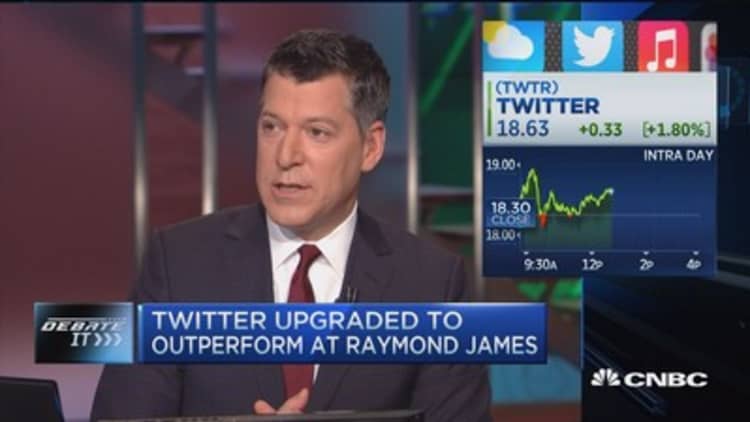Ahead of Twitter's quarterly earnings report on Tuesday, the stagnant user-base growth of the social-media company remains front and center.
Wall Street is expecting Twitter to show earnings per share of 10 cents on revenue of $607 million, according to consensus estimates from Thomson Reuters. That's compared to 7 cents per share on $435 million in revenue for the same period in 2015.
Twitter, once a promising tech darling, has been under pressure over the past year. The stock has fallen 65% since last April, and is down 66% from its 52-week intra-day high.
Central to analysts and investors' concerns is the lackluster growth in monthly active users (MAU). In Twitter's last quarterly report the company posted no user growth for the first time. Twitter's revenue is dependent on advertisers, which is why MAU is such a closely-watched metric.
The stagnant growth combined with management turnover and questionable product changes has led to concerns about Twitter's future.

Despite the stock's plummet, "Halftime Report" expert Josh Brown still believes in the San Francisco-based company. He bought Twitter on its IPO, and has no plans to sell. As a shareholder, he said he will be watching for guidance on how the company plans to continue monetization and user engagement.
But the focus remains on Twitter's MAU number.
Earlier this month Morgan Stanley analyst Brian Nowak cut his price target for Twitter to $16, noting that "engagement and new user trends remain troubling." Rob Sanderson of MKM Partners voiced similar concerns, writing "we think TWTR still has ample monetization opportunities, but overshadowed by user engagement issues that management is struggling to remedy."
Twitter's lack of growth is oftentimes compared unfavorably to the success of fellow social-media site Facebook.
Bull Josh Brown thinks that zeroing in on growth alone misses the broader point, which is that Twitter is an attractive buy because of its steadfast following.
"Of course they [Twitter] would like to have a billion users, but quite frankly they'll probably never get there because it's much more of a niche situation than Facebook," he argued on the "Halftime Report."
Brian Wieser of Pivotal Research echoes this point. "I don't focus on user growth because it's not relevant to the business in terms of how they generate revenue," he said over the phone. Like Brown, he argues that it is a "niche platform" and that modeling revenue based on user numbers is an "incorrect way to look at it."

That said, Brown did note the importance of MAU, saying that "stabilization of monthly active users is probably the most important data point to everyone that follows the story." Based on the analysts that he follows, Brown is bullish that Twitter will deliver positive results.
Twitter-critics also point to a turnaround in management as an ominous sign for the company. According to Goldman Sachs analyst Heath Terry, at least 20 senior executives have departed since Twitter's initial public offering in November, 2013.
The company was rocked at the upper echelon last June when then-CEO Dick Costolo announced his departure. Twitter founder Jack Dorsey was brought in as interim chief executive before taking the reins full time in October. But Dorsey now runs both Twitter and mobile-payments company Square, creating concerns over how effectively he can head two publicly-traded companies.
Despite efforts to halt erosion at the top, some still find the frequent changes troubling. "Management turnover and efforts to stem employee attrition are not encouraging," MKM Partners' Rob Sanderson wrote in his latest note. "We don't see how the departures...can be viewed as a positive in the middle of an attempted business turnaround," Stifel analyst Scott Devitt echoed when he downgraded the stock in January.
But not everyone thinks the turnover at the top is necessarily a negative indicator. Pivotal Research analyst Brian Wieser says it is something to be "mindful" of, but that the company is also simply changing to fit its needs. "Despite being public, [Twitter] has generally behaved as if it is a venture-funded enterprise. They are iterating, which is not something that public markets are used to seeing," he said over the phone.

The first quarter has traditionally been a strong one for the social-media stock. Between events like the Oscars and the Super Bowl there are important advertising opportunities in Q1, JMP Securities analyst Ronald Josey said in a call. Sanderson also noted that "a strong pipeline of media events over the next 2-3 quarters (U.S. elections and Rio Olympics) offer a tailwind for the most important metrics."
Twitter has responded to criticism by trying to innovate its namesake product. It has made changes to its interface, increased live-streaming capabilities, and added its "moments" feature. Earlier this month, Twitter also announced a partnership with the NFL to live stream 10 Thursday night and three Sunday morning games.
Brown believes that Dorsey's continued focus on the product could lead to positive catalysts for the stock. "I think really refining the user experience and continuing to work on product, which seems to be what Dorsey wants to do, I think any announcements in that vein will be positive," Brown argued.
Despite the questions surrounding Twitter's future, it seems that people haven't given up on the stock just yet. According to FactSet analyst estimates, there are 15 "buy" ratings on the stock, 25 "holds," and 4 "sells."
"Twitter has a powerful brand, a sizable first mover advantage, and a large installed base of interesting people," Wedbush analyst Michael Pachter wrote. But in an unforgiving market and with the stock already down 25% year-to-date, Twitter will need to pull more than just a bird out of its earnings hat.
Josh Brown owns Twitter.
- CNBC's Anita Balakrishnan contributed to this article.



